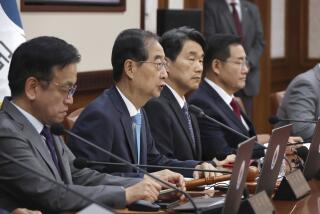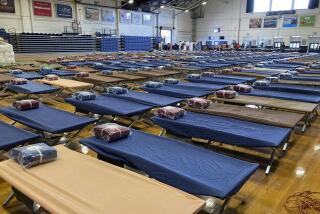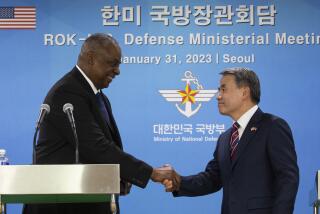Washington Eases Aggressive Posture Toward N. Korea : Diplomacy: At urging of leaders in Seoul, U.S. lifts threat to resume war games. Tensions rose after north declared nuclear sites off limits to inspectors.
- Share via
SEOUL — The United States softened its stance Wednesday in its nuclear proliferation dispute with North Korea, diluting a threat to resume war games with South Korea if Pyongyang does not allow international inspection of its nuclear facilities.
The action came at the urging of South Korean leaders in a series of meetings with visiting Defense Secretary William J. Perry. Seoul fears that too aggressive a posture by Washington might goad North Korea into war.
As late as two weeks ago, U.S. officials were hinting that they were about to announce a rescheduling of the military exercises, known as Team Spirit, because Pyongyang had not lived up to a pledge to let nuclear inspectors in.
But on Wednesday, Perry and South Korean Defense Minister Rhee Byoung Tae issued a statement that effectively postpones any decision on whether to reschedule Team Spirit exercises until next November.
Perry told a closing news conference today that the United States will “not initiate a war” and “will not provoke a war by any rash action on the peninsula.”
And a senior U.S. official indicated that Washington is planning to soon propose the resumption of the middle-level talks that the United States began with North Korean officials in New York but suspended.
Until recently, senior U.S. officials had been contending that no such talks would be held until North Korea fully complied with a U.N. Security Council demand that it open its nuclear facilities to international inspectors.
But U.S. officials said Wednesday that, although Washington will still insist that North Korea comply with the inspection demands, it will not set any conditions for resumption of the middle-level talks.
Perry also said Washington now is ready to postpone any further push for imposition of U.N. economic sanctions against North Korea until it has allowed enough time for the diplomatic effort to work.
“We intend to pursue diplomacy firmly and patiently until or unless there is no hope for diplomacy anymore,” he said. “And if that happens, we will go to the U.N. and seek imposition of sanctions.”
The softer approach was designed partly to take advantage of last week’s apparent softening of rhetoric by North Korean leader Kim Il Sung, which both U.S. and South Korean officials consider encouraging.
According to reports, Kim said Pyongyang does not want to acquire nuclear weapons and no longer will bar inspectors from its plants. While some officials are skeptical, they want to provide time for Kim to follow through.
South Korean Foreign Minister Han Sung Joo told reporters that with Wednesday’s conciliatory gestures, the United States and South Korea believe that they have done all they can to bring a settlement.
“We on our part have done our best for an international solution,” he said. What happens next, he said, “depends entirely on North Korea. It is time now for Pyongyang to act. The ball is in its court.”
The more conciliatory stance on the diplomatic front is only part of the strategy that the Clinton Administration is following. It is also bolstering the ability of U.S. and South Korean forces to combat a North Korean attack.
The first of 48 Patriot air-defense missile-launchers that Perry has ordered sent to South Korea arrived here earlier this week. They will be deployed by mid-May, he said.
The United States is also making plans to stockpile more munitions and spare parts for allied fighter jets stationed here and to send dozens of Apache attack helicopters to replace the aging Cobras now on duty.
And on Wednesday, U.S. officials said South Korea has agreed to buy a long list of devices to modernize or upgrade its forces and equipment, from night-vision goggles to precision-guided antitank missiles.
The to-and-fro regarding the Team Spirit exercises is largely symbolic. Although the issue is important politically to North Korea, U.S. officials say canceling them has little bearing on U.S. and South Korean military readiness.
Officials said that, if the exercises are held in November or December, they will probably be somewhat smaller than the massive war games that had been scheduled for March.
More to Read
Sign up for Essential California
The most important California stories and recommendations in your inbox every morning.
You may occasionally receive promotional content from the Los Angeles Times.













